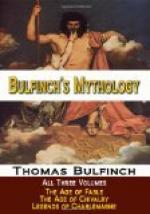Among the rest Astolpho perceived many days of his own lost, and many imprudent sallies which he had made, and would have been glad not to have been reminded of. But he also saw among so many lost things a great abundance of one thing which men are apt to think they all possess, and do not think it necessary to pray for,— good sense. This commodity appeared under the form of a liquor, most light and apt to evaporate. It was therefore kept in vials, firmly sealed. One of these was labelled, “The sense of the Paladin Orlando.”
All the bottles were ticketed, and the sage placed one in Astolpho’s hand, which he found was his own. It was more than half full. He was surprised to find there many other vials which contained almost the whole of the wits of many persons who passed among men for wise. Ah, how easy it is to lose one’s reason! Some lose theirs by yielding to the sway of the passions; some in braving tempests and shoals in search of wealth; some by trusting too much to the promises of the great; some by setting their hearts on trifles. As might have been expected, the bottles which held the wits of astrologers, inventors, metaphysicians, and above all, of poets, were in general the best filled of all.
Astolpho took his bottle, put it to his nose, and inhaled it all; and Turpin assures us that he was for a long time afterwards as sage as one could wish; but the Archbishop adds that there was reason to fear that some of the precious fluid afterwards found its way back into the bottle. The paladin took also the bottle which belonged to Orlando. It was a large one, and quite full.
Before quitting the planetary region Astolpho was conducted to an edifice on the borders of a river. He was shown an immense hall full of bundles of silk, linen, cotton, and wool. A thousand different colors, brilliant or dull, some quite black, were among these skeins. In one part of the hall an old woman was busy winding off yarns from all these different bundles. When she had finished a skein another ancient dame took it and placed it with others; a third selected from the fleeces spun, and mingled them in due proportions. The paladin inquired what all this might be. “These old women,” said the saint, “are the Fates, who spin, measure, and terminate the lives of mortals. As long as the thread stretches in one of those skeins, so long does the mortal enjoy the light of day; but nature and death are on the alert to shut the eyes of those whose thread is spun.”
Each one of the skeins had a label of gold, silver, or iron, bearing the name of the individual to whom it belonged. An old man, who, in spite of the burden of years, seemed brisk and active, ran without ceasing to fill his apron with these labels, and carried them away to throw them into the river, whose name was Lethe. When he reached the shore of the river the old man shook out his apron, and the labels sunk to the bottom. A small number only floated for




